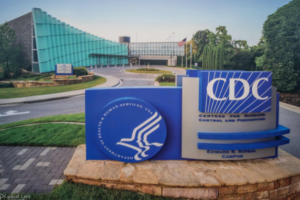GOOD AND BAD BACTERIA IN YOUR STOMACH are battling each other every moment. When bad bacteria gain the advantage, you feel the fallout, with cramps, gas, bloating, heartburn and an array of other GI symptoms.
In this article, we’ll discuss the important role of good bacteria and how you can support the war effort, easily, naturally, inexpensively, and without any adverse side effects. Sounds great, right?
And later I’ll share with you how a balanced gut is the key to your immune system’s ability to fight infection and win.

Source: Wikimedia Commons
As you know, stomach bacteria are essential for the proper functioning of the digestive system, with all its health benefits. That includes increased energy and improved mood.

Source: picryl.com
The US Centers For Disease Control (CDC) warns that there is an important connection between microbial ecology and our health and wellbeing.
Let’s consider how bacteria in the stomach can have both beneficial and harmful effects on your health and energy. Knowing the difference between good and bad bacteria in your stomach is essential for maintaining a healthy digestive system. It’s our job to maintain an optimal balance between the good and bad bacteria.
Good bacteria in the stomach help to break down and digest food. They produce and absorb nutrients that are essential for good health. They help produce vitamins for use throughout your body. And good bacteria also wage war to fight off an imbalance, the overgrowth of bad bacteria.
Imbalanced stomach bacteria can lead to various illnesses and health problems. The causes of imbalanced stomach bacteria can be attributed to a variety of issues, such as poor diet, chronic stress, consistent lack of sleep, and certain medications, especially antibiotics.
When the bad bacteria overpower the good, they can cause serious digestive problems and lead to infections. Bad bacteria can cause stomach illnesses such as ulcers, diarrhea, vomiting, bloating, constipation, and other digestive issues.
There are several ways to naturally balance your stomach bacteria, like consuming probiotics, eating a balanced diet that’s rich in fiber, and avoiding antibiotic use. Additionally, it can be quite beneficial to include fermented foods in your diet.
An example is sauerkraut, with natural probiotics.
Supercharge the good bacteria by eating other probiotic-rich foods, like yogurt or kimchi. And boost probiotics by taking prebiotic supplements, or using garlic and oregano oil, which act as natural antibiotics.

Source: https://blogs.cdc.gov/safehealthcare/germs-lead-the-way/
Let’s focus on the stomach and its role in fighting infection. According to the CDC:
…when we take antibiotics, antifungals, or other therapeutics, these drugs kill all germs—both the harmful and helpful. This disrupts our microbiome, allowing the surviving pathogens, which are often resistant to the treatment, to dominate our microbiome. This can lead to infection.
The CDC also informs us that our risk for infection is increased when a threatening pathogen, or viral invader, enters our body but we don’t yet have symptoms. The CDC goes on to explain that our risk for infection increases even further when our bacteria are imbalanced, with inadequate good bacteria to win the war early.
Some infectious pathogens, such as C. diff, are particularly resistant to treatment. Antibiotics may work for a while. But infections caused by antibiotic-resistant germs can be deadly. That’s particularly common when stomach bacteria is unbalanced and bad bacteria win the war.

Source: Veganrocks.com
When people take antibiotics (or antifungals), the good bacteria are also wiped out along with the infection. It may take weeks or months for the good bacteria to repopulate and rebalance.
That’s why it’s really important to eat healthy foods and take probiotic supplements during a round of antibiotic medication. It’s best to avoid them completely, but in extreme cases of infection they may be necessary.
One clinical study found that:
“Hosts can adapt to infections by nourishing their gut microbiota with taurine [an amino acid], a strategy that serves to boost the microbiota’s production of sulfide and ensure its heightened resistance against future pathogen invasions.”
In simpler terms, they suggest you supplement with the amino acid Taurine, which helps protect you against infections.
By following these simple steps, you can help maintain a healthy balance of bacteria in your stomach and improve your overall health.
References:
https://blogs.cdc.gov/safehealthcare/germs-lead-the-way/
https://www.cdc.gov/drugresistance/microbial-ecology.html
https://www.nih.gov/news-events/nih-research-matters/gut-bacteria-use-nutrient-fight-germs


